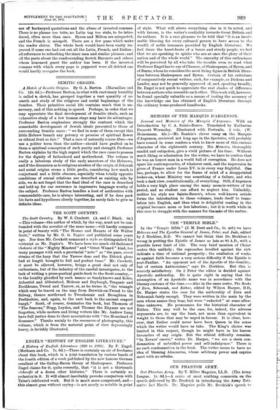THE scow COUNTRY.
The Scott Country. By W. S. Crockett. (A. and C. Black. 6s.) —This volume—the author of which, by the way, must not be con- founded with the novelist of the same name—will hardly compare in point of beauty with "The Homes and Haunts of Sir Walter Scott," written by Mr. G. G. Napier and published some years ago. Nor does Mr. Crockett command a style so distinguished for restraint as Mr. Napier's. We have here too much old-fashioned rhetoric of the "Mighty Minstrel" and "Great Wizard" kind, too many passages with such a provincial "note" as "the pure, sweet strains of the harp that the Yarrow dens and the Ettrick glens had at length brought to full and perfect tune." Mr. Crockett, it must be allowed, however, brings a great deal not only of enthusiasm, but of the industry of the careful investigator, to the task of writing a prose-poetical guide-book to the Scott country,— to the locality glorified by such names as Sandyknowe and Kelso, Ashestiel and Abbotsford, Melrose and Dryburgh, Traquair and Ercildoune, Tweed and Yarrow, or, as he terms it, "the triangle which may be traced on the map from Berwick-on-Tweed to the Solway, thence northward to Tweedsmuir and Broughton in Peebleshire, and, again, to the east back to the ancient seaport burgh." Scott, of course, dominates the book, but Thomson of "The Seasons," Hogg, Leyden, and Thomas the Rhymer are not forgotten, while modern and living writers like Mr. Andrew Lang have full justice done to their associations with "the Homeland of Romance." Thanks mainly to the resources of photography, this volume, which is from the material point of view depressingly heavy, is lavishly illustrated.


















































 Previous page
Previous page